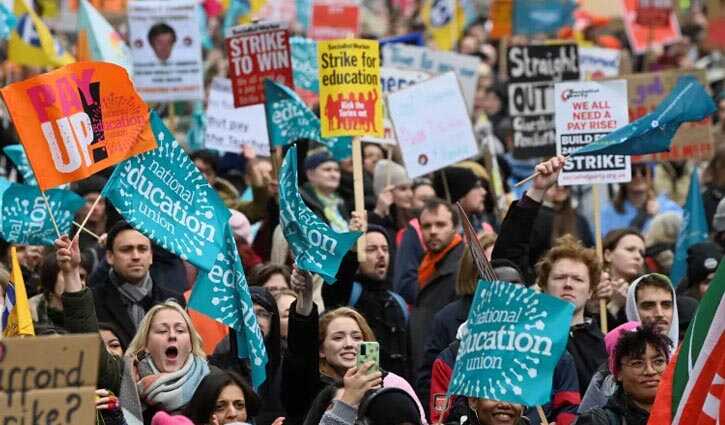
The largest strike to hit Britain in almost a decade caused rail networks to be interrupted and schools to close.
Due to industrial disputes over wages and working conditions, over half a million British workers are scheduled to go on strike until Wednesday. 300,000 teachers in England, teachers in two unions in Scotland, around 100,000 public servants in more than 100 departments, 70,000 employees of universities, and approximately 100,000 rail and bus drivers are among those taking part in the strike action.
Since the public sector pay dispute in 2011, when over a million workers took industrial action, there has not been widespread strike action.
There will be travel and service disruptions, tens of thousands of shuttered or partially closed schools, hundreds of picket lines and rallies by laborers.
UK unions want pension reform, inflation-beating pay increases, and no reductions in redundancy terms. The National Union of Teachers (NEU) is demanding a pay increase that is higher than inflation because employees are leaving the field.
There will also be protests against a law that was approved by Parliament that aims to impose minimum service requirements in some industries.
According to the Trades Union Congress, the law is “wrong, unworkable, and almost certainly illegal.” Most unions are striking for a few days at a time, sometimes for several months.
There have also been planned strikes by firefighters, postal workers, ambulance drivers, and nurses employed by the National Health Service. Between August and October, average salary in the public sector increased by 2.7% (excluding bonuses) as inflation surpassed 10%.
Inflation remains at historic highs, particularly in areas affecting workers with lower salaries. Grocery price inflation reached a record 16.7% in the four weeks to January 22. The government has prepared to mitigate disruptions caused by widespread strike action, with contingency plans in place. The best mitigation would be for union bosses to call off planned strikes, continue talking, and reach an agreement.
